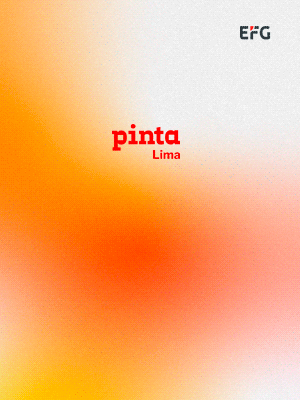THEME AND CURATORIAL CONCEPT FOR THE 36TH SÃO PAULO BIENNIAL ANNOUNCED
Under the general curatorship of Bonaventure by Soh Bejen Ndikung, the 36th São Paulo Biennial announces its title, curatorial concept, collaborators and visual identity, in addition to informing about an important change in its exhibition period. The title will be: Nem todo viandante anda estradas / Da humanidade como prática [Not All Travelers Walk Roads / Of Humanity as Practice].
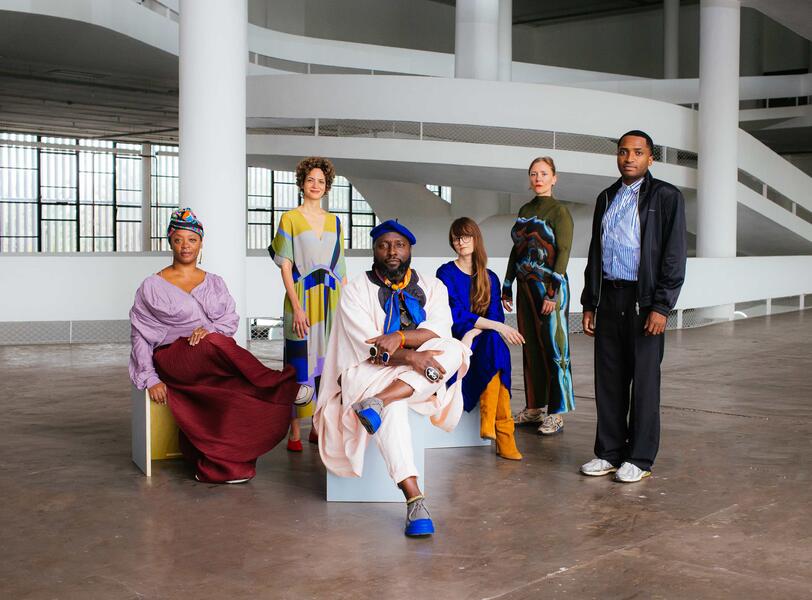
The Fundação Bienal de São Paulo announces the title, curatorial concept, collaborators and visual identity of the 36th São Paulo Biennial, which will take place from September 2025 at the Ciccillo Matarazzo Pavilion. Entitled Nem todo viandante anda estradas - Da humanidade como prática [ Not All Travellers Walk Roads - Of Humanity as Practice], the edition will be led by general curator Prof. Dr. Bonaventure Soh Bejeng Ndikung with his team of co-curators consisting of Alya Sebti, Anna Roberta Goetz and Thiago de Paula Souza, as well as co-curator Keyna Eleison and communication and strategy consultant Henriette Gallus. The exhibition is inspired by the enigmatic poem by Afro-Brazilian poet Conceição Evaristo, Da calma e do silêncio.
The exhibition also comes with a historic change in the organization of the event, which has traditionally been held from September to December. The Fundação Bienal is pleased to announce that the 36th edition of the exhibition will be extended for four more weeks, being presented from September to December.
The central proposal of this Biennial is to rethink humanity as a verb, as a living practice, in a world that demands reimagining relationships, asymmetries and listening as the basis for coexistence, based on three curatorial fragments/axes. The metaphor of the estuary - a place where different water currents converge and create a space for coexistence - guides the curatorial project, inspired by Brazilian philosophies, landscapes and mythologies. This concept reflects the multiplicity of encounters that have marked the history of Brazil and proposes that humanity unites and transforms itself through attentive listening and negotiation between different beings and worlds.
-
Equipo conceptual de la 36ª Bienal de São Paulo, de la izquierda hacia la derecha: Keyna Eleison, Alya Sebti, Bonaventure Soh Bejeng Ndikung, Henriette Gallus, Anna Roberta Goetz y Thiago de Paula Souza © João Medeiros / Fundação Bienal de São Paulo
-
Equipo conceptual de la 36ª Bienal de São Paulo, de la izquierda hacia la derecha: Keyna Eleison, Alya Sebti, Bonaventure Soh Bejeng Ndikung, Henriette Gallus, Anna Roberta Goetz y Thiago de Paula Souza © João Medeiros / Fundação Bienal de São Paulo
-
Prof. Dr. Bonaventure Soh Bejeng Ndikung © João Medeiros / Fundação Bienal de São Paulo
The curatorial proposal
This edition of the São Paulo Biennial is structured as a research project that will manifest itself in three fragments/axes. The first curatorial fragment/axis proposes to reclaim space and time, seeking to slow down and pay attention to the details and other beings that constitute our environment. Set in the poem Da calma e do silêncio by Conceição Evaristo, this axis evokes the importance of exploring the submerged worlds that only the silence of poetry and poetic listening can access, welcoming differences and suggesting a reconnection with nature and its subtleties.
In the second fragment/axis, the Biennial invites the public to see themselves in the reflection of the other. The proposal is to question what we see when we look at ourselves and others, confronting the barriers and borders of our societies. This fragment is based on the poem Une conscience en fleur pour autrui by Haitian poet René Depestre, and explores the interconnectivity of experiences, proposing a coexistence more attentive to collective needs.
Finally, the third fragment/axis focuses on spaces of encounters, just as estuaries are spaces of multiple convergences, not only between fresh and salt water, but also the encounter of the so-called New World with enslaved people abducted from Africa. This excerpt reflects on coloniality, its power structures and its ramifications in our societies today.
May interest you
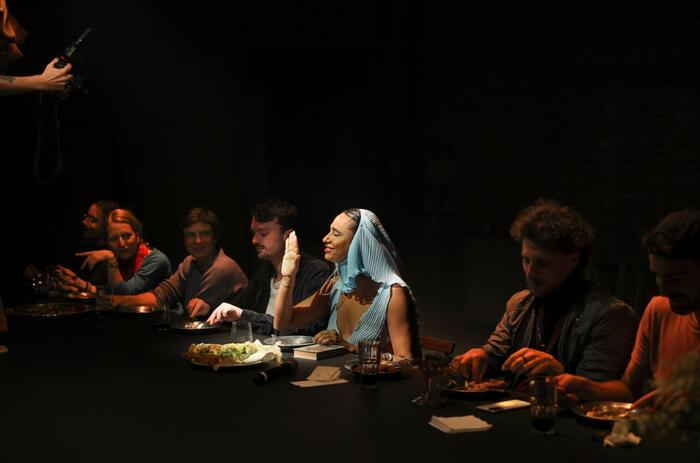
The Museum of Modern Art of São Paulo presents the 38th Panorama of Brazilian Art: Mil Graus [A thousand degrees], an exhibition curated by Germano Dushá and Thiago de Paula Souza, and co-curated by Ariana Nuala, whose title evokes the idea of a “heat-limit,” where everything is transformed, referring to the intense climatic and metaphysical conditions that challenge and lead to inevitable processes of transmutation. In this edition, the MAM biennial exhibition presents 34 artists from 16 Brazilian states.
THE 38TH BRAZILIAN ART PANORAMA: ECOLOGY AND FUTURE
The Museum of Modern Art of São Paulo presents the 38th Panorama of Brazilian Art: Mil Graus [A thousand degrees], an exhibition curated by Germano Dushá and Thiago de Paula Souza, and co-curated by Ariana Nuala, whose title evokes the idea of a “heat-limit,” where everything is transformed, referring to the intense climatic and metaphysical conditions that challenge and lead to inevitable processes of transmutation. In this edition, the MAM biennial exhibition presents 34 artists from 16 Brazilian states.

The Museum of Modern Art of São Paulo presents the 38th Panorama of Brazilian Art: Mil Graus [A thousand degrees], an exhibition curated by Germano Dushá and Thiago de Paula Souza, and co-curated by Ariana Nuala, whose title evokes the idea of a “heat-limit,” where everything is transformed, referring to the intense climatic and metaphysical conditions that challenge and lead to inevitable processes of transmutation. In this edition, the MAM biennial exhibition presents 34 artists from 16 Brazilian states.
THE 38TH BRAZILIAN ART PANORAMA: ECOLOGY AND FUTURE
The Museum of Modern Art of São Paulo presents the 38th Panorama of Brazilian Art: Mil Graus [A thousand degrees], an exhibition curated by Germano Dushá and Thiago de Paula Souza, and co-curated by Ariana Nuala, whose title evokes the idea of a “heat-limit,” where everything is transformed, referring to the intense climatic and metaphysical conditions that challenge and lead to inevitable processes of transmutation. In this edition, the MAM biennial exhibition presents 34 artists from 16 Brazilian states.
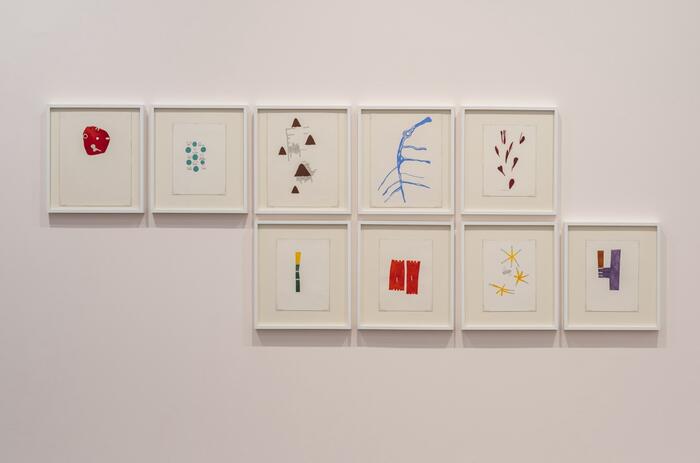
El Museo de Arte de São Paulo (MASP) presenta la exposición Leonilson: Ahora y Oportunidades, dedicada al artista, que fue figura clave en la escena brasileña de finales del siglo XX. La muestra abarca sus últimos años creativos, donde explora temas de amor, pérdida y la fragilidad humana con una voz íntima y única.
LEONILSON EN EL MASP: ENTRE LA VULNERABILIDAD Y EL PODER
El Museo de Arte de São Paulo (MASP) presenta la exposición Leonilson: Ahora y Oportunidades, dedicada al artista, que fue figura clave en la escena brasileña de finales del siglo XX. La muestra abarca sus últimos años creativos, donde explora temas de amor, pérdida y la fragilidad humana con una voz íntima y única.
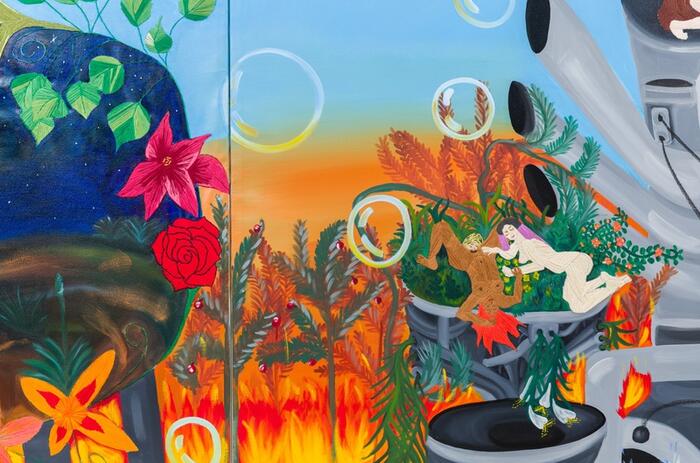
Siluetas sobre maleza [Silhouettes on grass] is a group exhibition at Museo Jumex that explores the ways in which bodies exist and inhabit territory. Spanning several generations, the exhibition features artists who explore the intertwined associations of body, land and identity in Latin America's history and present: Minia Biabiany (Guadalupe, 1988), Vivian Caccuri (Brazil, 1986), Frieda Toranzo Jaeger (Mexico, 1988), Ana Mendieta (Cuba, 1948 - USA, 1985), Nohemí Pérez (Colombia, 1962) and Vivian Suter (Argentina, 1949).
BODIES & TERRITORY: A GROUP EXHIBITION AT JUMEX MUSEUM
Siluetas sobre maleza [Silhouettes on grass] is a group exhibition at Museo Jumex that explores the ways in which bodies exist and inhabit territory. Spanning several generations, the exhibition features artists who explore the intertwined associations of body, land and identity in Latin America's history and present: Minia Biabiany (Guadalupe, 1988), Vivian Caccuri (Brazil, 1986), Frieda Toranzo Jaeger (Mexico, 1988), Ana Mendieta (Cuba, 1948 - USA, 1985), Nohemí Pérez (Colombia, 1962) and Vivian Suter (Argentina, 1949).
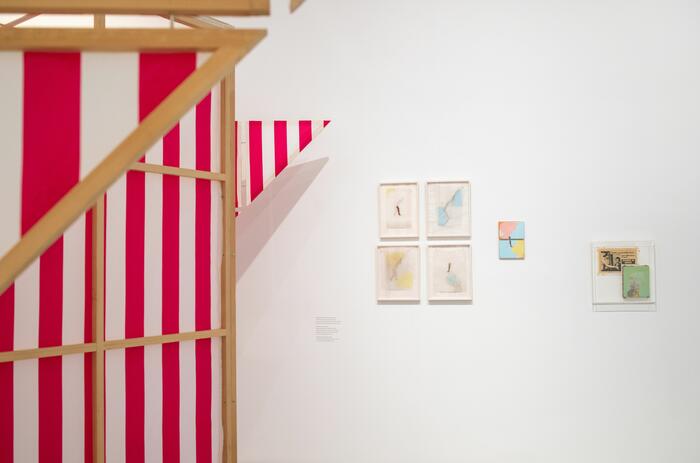
“I imagine the museum as an archipelago. It is not a continent, but an archipelago (...) The idea today is to put the world in contact with the world, to put some parts of the world in contact with other parts of the world... We must multiply the number of worlds inside museums”. Édouard Glissant (Sainte-Marie, Martinique, 1929-Paris, France, 2011) expressed his vision of museum functionality in this metaphorical way in his work Poetics of Relationship (1990).
CAN THE ARCHIPELAGO ENTER THE MUSEUM? IBEROAMERICA IN THE PROPOSAL OF THE HELGA DE ALVEAR MUSEUM
“I imagine the museum as an archipelago. It is not a continent, but an archipelago (...) The idea today is to put the world in contact with the world, to put some parts of the world in contact with other parts of the world... We must multiply the number of worlds inside museums”. Édouard Glissant (Sainte-Marie, Martinique, 1929-Paris, France, 2011) expressed his vision of museum functionality in this metaphorical way in his work Poetics of Relationship (1990).
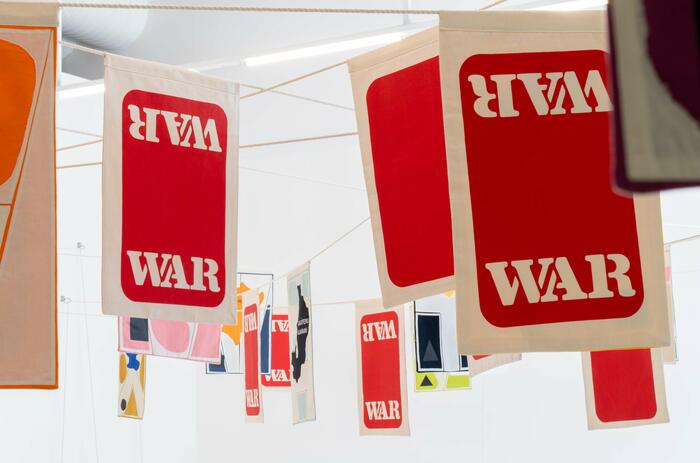
Inhotim is presenting three new projects at the end of 2024, in which the protagonists are Rebeca Carapiá, Pipilotti Rist and Rivane Neuenschwander. Three very different strategies by names of different visibilities and generations, which help to forge a moment in the institution that seems more connected to the fascinating and special nature of the place, without leaving aside lively questions about the strange days we are living through.
MAGIC LIGHTS, BOILING SURFACES - REBECA CARAPIÁ, PIPILOTTI RIST AND RIVANE NEUENSCHWANDER
Inhotim is presenting three new projects at the end of 2024, in which the protagonists are Rebeca Carapiá, Pipilotti Rist and Rivane Neuenschwander. Three very different strategies by names of different visibilities and generations, which help to forge a moment in the institution that seems more connected to the fascinating and special nature of the place, without leaving aside lively questions about the strange days we are living through.
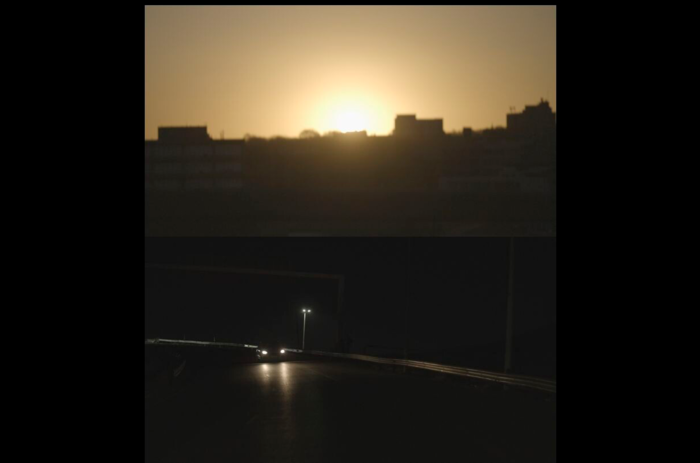
Dim Corners is an evocative exhibition in Johannesburg featuring new works by Brazilian artist Leticia Ramos and South African artist Zen Marie. The exhibition takes into account the city’s frequent energy shortages, and also the recent blackouts that São Paulo had experienced since this project started, weaving a narrative that intertwines the immediate physical impact with the broader, insidious issues of climate change and environmental racism.
LETICIA RAMOS & ZEN MARIE IN A COLLABORATIVE PROJECT
Dim Corners is an evocative exhibition in Johannesburg featuring new works by Brazilian artist Leticia Ramos and South African artist Zen Marie. The exhibition takes into account the city’s frequent energy shortages, and also the recent blackouts that São Paulo had experienced since this project started, weaving a narrative that intertwines the immediate physical impact with the broader, insidious issues of climate change and environmental racism.

The Museum of Modern Art of São Paulo presents the 38th Panorama of Brazilian Art: Mil Graus [A thousand degrees], an exhibition curated by Germano Dushá and Thiago de Paula Souza, and co-curated by Ariana Nuala, whose title evokes the idea of a “heat-limit,” where everything is transformed, referring to the intense climatic and metaphysical conditions that challenge and lead to inevitable processes of transmutation. In this edition, the MAM biennial exhibition presents 34 artists from 16 Brazilian states.
THE 38TH BRAZILIAN ART PANORAMA: ECOLOGY AND FUTURE
The Museum of Modern Art of São Paulo presents the 38th Panorama of Brazilian Art: Mil Graus [A thousand degrees], an exhibition curated by Germano Dushá and Thiago de Paula Souza, and co-curated by Ariana Nuala, whose title evokes the idea of a “heat-limit,” where everything is transformed, referring to the intense climatic and metaphysical conditions that challenge and lead to inevitable processes of transmutation. In this edition, the MAM biennial exhibition presents 34 artists from 16 Brazilian states.

El Museo de Arte de São Paulo (MASP) presenta la exposición Leonilson: Ahora y Oportunidades, dedicada al artista, que fue figura clave en la escena brasileña de finales del siglo XX. La muestra abarca sus últimos años creativos, donde explora temas de amor, pérdida y la fragilidad humana con una voz íntima y única.
LEONILSON EN EL MASP: ENTRE LA VULNERABILIDAD Y EL PODER
El Museo de Arte de São Paulo (MASP) presenta la exposición Leonilson: Ahora y Oportunidades, dedicada al artista, que fue figura clave en la escena brasileña de finales del siglo XX. La muestra abarca sus últimos años creativos, donde explora temas de amor, pérdida y la fragilidad humana con una voz íntima y única.

Siluetas sobre maleza [Silhouettes on grass] is a group exhibition at Museo Jumex that explores the ways in which bodies exist and inhabit territory. Spanning several generations, the exhibition features artists who explore the intertwined associations of body, land and identity in Latin America's history and present: Minia Biabiany (Guadalupe, 1988), Vivian Caccuri (Brazil, 1986), Frieda Toranzo Jaeger (Mexico, 1988), Ana Mendieta (Cuba, 1948 - USA, 1985), Nohemí Pérez (Colombia, 1962) and Vivian Suter (Argentina, 1949).
BODIES & TERRITORY: A GROUP EXHIBITION AT JUMEX MUSEUM
Siluetas sobre maleza [Silhouettes on grass] is a group exhibition at Museo Jumex that explores the ways in which bodies exist and inhabit territory. Spanning several generations, the exhibition features artists who explore the intertwined associations of body, land and identity in Latin America's history and present: Minia Biabiany (Guadalupe, 1988), Vivian Caccuri (Brazil, 1986), Frieda Toranzo Jaeger (Mexico, 1988), Ana Mendieta (Cuba, 1948 - USA, 1985), Nohemí Pérez (Colombia, 1962) and Vivian Suter (Argentina, 1949).

“I imagine the museum as an archipelago. It is not a continent, but an archipelago (...) The idea today is to put the world in contact with the world, to put some parts of the world in contact with other parts of the world... We must multiply the number of worlds inside museums”. Édouard Glissant (Sainte-Marie, Martinique, 1929-Paris, France, 2011) expressed his vision of museum functionality in this metaphorical way in his work Poetics of Relationship (1990).
CAN THE ARCHIPELAGO ENTER THE MUSEUM? IBEROAMERICA IN THE PROPOSAL OF THE HELGA DE ALVEAR MUSEUM
“I imagine the museum as an archipelago. It is not a continent, but an archipelago (...) The idea today is to put the world in contact with the world, to put some parts of the world in contact with other parts of the world... We must multiply the number of worlds inside museums”. Édouard Glissant (Sainte-Marie, Martinique, 1929-Paris, France, 2011) expressed his vision of museum functionality in this metaphorical way in his work Poetics of Relationship (1990).

Inhotim is presenting three new projects at the end of 2024, in which the protagonists are Rebeca Carapiá, Pipilotti Rist and Rivane Neuenschwander. Three very different strategies by names of different visibilities and generations, which help to forge a moment in the institution that seems more connected to the fascinating and special nature of the place, without leaving aside lively questions about the strange days we are living through.
MAGIC LIGHTS, BOILING SURFACES - REBECA CARAPIÁ, PIPILOTTI RIST AND RIVANE NEUENSCHWANDER
Inhotim is presenting three new projects at the end of 2024, in which the protagonists are Rebeca Carapiá, Pipilotti Rist and Rivane Neuenschwander. Three very different strategies by names of different visibilities and generations, which help to forge a moment in the institution that seems more connected to the fascinating and special nature of the place, without leaving aside lively questions about the strange days we are living through.

Dim Corners is an evocative exhibition in Johannesburg featuring new works by Brazilian artist Leticia Ramos and South African artist Zen Marie. The exhibition takes into account the city’s frequent energy shortages, and also the recent blackouts that São Paulo had experienced since this project started, weaving a narrative that intertwines the immediate physical impact with the broader, insidious issues of climate change and environmental racism.
LETICIA RAMOS & ZEN MARIE IN A COLLABORATIVE PROJECT
Dim Corners is an evocative exhibition in Johannesburg featuring new works by Brazilian artist Leticia Ramos and South African artist Zen Marie. The exhibition takes into account the city’s frequent energy shortages, and also the recent blackouts that São Paulo had experienced since this project started, weaving a narrative that intertwines the immediate physical impact with the broader, insidious issues of climate change and environmental racism.

The Museum of Modern Art of São Paulo presents the 38th Panorama of Brazilian Art: Mil Graus [A thousand degrees], an exhibition curated by Germano Dushá and Thiago de Paula Souza, and co-curated by Ariana Nuala, whose title evokes the idea of a “heat-limit,” where everything is transformed, referring to the intense climatic and metaphysical conditions that challenge and lead to inevitable processes of transmutation. In this edition, the MAM biennial exhibition presents 34 artists from 16 Brazilian states.
THE 38TH BRAZILIAN ART PANORAMA: ECOLOGY AND FUTURE
The Museum of Modern Art of São Paulo presents the 38th Panorama of Brazilian Art: Mil Graus [A thousand degrees], an exhibition curated by Germano Dushá and Thiago de Paula Souza, and co-curated by Ariana Nuala, whose title evokes the idea of a “heat-limit,” where everything is transformed, referring to the intense climatic and metaphysical conditions that challenge and lead to inevitable processes of transmutation. In this edition, the MAM biennial exhibition presents 34 artists from 16 Brazilian states.

El Museo de Arte de São Paulo (MASP) presenta la exposición Leonilson: Ahora y Oportunidades, dedicada al artista, que fue figura clave en la escena brasileña de finales del siglo XX. La muestra abarca sus últimos años creativos, donde explora temas de amor, pérdida y la fragilidad humana con una voz íntima y única.
LEONILSON EN EL MASP: ENTRE LA VULNERABILIDAD Y EL PODER
El Museo de Arte de São Paulo (MASP) presenta la exposición Leonilson: Ahora y Oportunidades, dedicada al artista, que fue figura clave en la escena brasileña de finales del siglo XX. La muestra abarca sus últimos años creativos, donde explora temas de amor, pérdida y la fragilidad humana con una voz íntima y única.

Siluetas sobre maleza [Silhouettes on grass] is a group exhibition at Museo Jumex that explores the ways in which bodies exist and inhabit territory. Spanning several generations, the exhibition features artists who explore the intertwined associations of body, land and identity in Latin America's history and present: Minia Biabiany (Guadalupe, 1988), Vivian Caccuri (Brazil, 1986), Frieda Toranzo Jaeger (Mexico, 1988), Ana Mendieta (Cuba, 1948 - USA, 1985), Nohemí Pérez (Colombia, 1962) and Vivian Suter (Argentina, 1949).
BODIES & TERRITORY: A GROUP EXHIBITION AT JUMEX MUSEUM
Siluetas sobre maleza [Silhouettes on grass] is a group exhibition at Museo Jumex that explores the ways in which bodies exist and inhabit territory. Spanning several generations, the exhibition features artists who explore the intertwined associations of body, land and identity in Latin America's history and present: Minia Biabiany (Guadalupe, 1988), Vivian Caccuri (Brazil, 1986), Frieda Toranzo Jaeger (Mexico, 1988), Ana Mendieta (Cuba, 1948 - USA, 1985), Nohemí Pérez (Colombia, 1962) and Vivian Suter (Argentina, 1949).

“I imagine the museum as an archipelago. It is not a continent, but an archipelago (...) The idea today is to put the world in contact with the world, to put some parts of the world in contact with other parts of the world... We must multiply the number of worlds inside museums”. Édouard Glissant (Sainte-Marie, Martinique, 1929-Paris, France, 2011) expressed his vision of museum functionality in this metaphorical way in his work Poetics of Relationship (1990).
CAN THE ARCHIPELAGO ENTER THE MUSEUM? IBEROAMERICA IN THE PROPOSAL OF THE HELGA DE ALVEAR MUSEUM
“I imagine the museum as an archipelago. It is not a continent, but an archipelago (...) The idea today is to put the world in contact with the world, to put some parts of the world in contact with other parts of the world... We must multiply the number of worlds inside museums”. Édouard Glissant (Sainte-Marie, Martinique, 1929-Paris, France, 2011) expressed his vision of museum functionality in this metaphorical way in his work Poetics of Relationship (1990).

Inhotim is presenting three new projects at the end of 2024, in which the protagonists are Rebeca Carapiá, Pipilotti Rist and Rivane Neuenschwander. Three very different strategies by names of different visibilities and generations, which help to forge a moment in the institution that seems more connected to the fascinating and special nature of the place, without leaving aside lively questions about the strange days we are living through.
MAGIC LIGHTS, BOILING SURFACES - REBECA CARAPIÁ, PIPILOTTI RIST AND RIVANE NEUENSCHWANDER
Inhotim is presenting three new projects at the end of 2024, in which the protagonists are Rebeca Carapiá, Pipilotti Rist and Rivane Neuenschwander. Three very different strategies by names of different visibilities and generations, which help to forge a moment in the institution that seems more connected to the fascinating and special nature of the place, without leaving aside lively questions about the strange days we are living through.

Dim Corners is an evocative exhibition in Johannesburg featuring new works by Brazilian artist Leticia Ramos and South African artist Zen Marie. The exhibition takes into account the city’s frequent energy shortages, and also the recent blackouts that São Paulo had experienced since this project started, weaving a narrative that intertwines the immediate physical impact with the broader, insidious issues of climate change and environmental racism.
LETICIA RAMOS & ZEN MARIE IN A COLLABORATIVE PROJECT
Dim Corners is an evocative exhibition in Johannesburg featuring new works by Brazilian artist Leticia Ramos and South African artist Zen Marie. The exhibition takes into account the city’s frequent energy shortages, and also the recent blackouts that São Paulo had experienced since this project started, weaving a narrative that intertwines the immediate physical impact with the broader, insidious issues of climate change and environmental racism.

The Museum of Modern Art of São Paulo presents the 38th Panorama of Brazilian Art: Mil Graus [A thousand degrees], an exhibition curated by Germano Dushá and Thiago de Paula Souza, and co-curated by Ariana Nuala, whose title evokes the idea of a “heat-limit,” where everything is transformed, referring to the intense climatic and metaphysical conditions that challenge and lead to inevitable processes of transmutation. In this edition, the MAM biennial exhibition presents 34 artists from 16 Brazilian states.
THE 38TH BRAZILIAN ART PANORAMA: ECOLOGY AND FUTURE
The Museum of Modern Art of São Paulo presents the 38th Panorama of Brazilian Art: Mil Graus [A thousand degrees], an exhibition curated by Germano Dushá and Thiago de Paula Souza, and co-curated by Ariana Nuala, whose title evokes the idea of a “heat-limit,” where everything is transformed, referring to the intense climatic and metaphysical conditions that challenge and lead to inevitable processes of transmutation. In this edition, the MAM biennial exhibition presents 34 artists from 16 Brazilian states.

El Museo de Arte de São Paulo (MASP) presenta la exposición Leonilson: Ahora y Oportunidades, dedicada al artista, que fue figura clave en la escena brasileña de finales del siglo XX. La muestra abarca sus últimos años creativos, donde explora temas de amor, pérdida y la fragilidad humana con una voz íntima y única.
LEONILSON EN EL MASP: ENTRE LA VULNERABILIDAD Y EL PODER
El Museo de Arte de São Paulo (MASP) presenta la exposición Leonilson: Ahora y Oportunidades, dedicada al artista, que fue figura clave en la escena brasileña de finales del siglo XX. La muestra abarca sus últimos años creativos, donde explora temas de amor, pérdida y la fragilidad humana con una voz íntima y única.

Siluetas sobre maleza [Silhouettes on grass] is a group exhibition at Museo Jumex that explores the ways in which bodies exist and inhabit territory. Spanning several generations, the exhibition features artists who explore the intertwined associations of body, land and identity in Latin America's history and present: Minia Biabiany (Guadalupe, 1988), Vivian Caccuri (Brazil, 1986), Frieda Toranzo Jaeger (Mexico, 1988), Ana Mendieta (Cuba, 1948 - USA, 1985), Nohemí Pérez (Colombia, 1962) and Vivian Suter (Argentina, 1949).
BODIES & TERRITORY: A GROUP EXHIBITION AT JUMEX MUSEUM
Siluetas sobre maleza [Silhouettes on grass] is a group exhibition at Museo Jumex that explores the ways in which bodies exist and inhabit territory. Spanning several generations, the exhibition features artists who explore the intertwined associations of body, land and identity in Latin America's history and present: Minia Biabiany (Guadalupe, 1988), Vivian Caccuri (Brazil, 1986), Frieda Toranzo Jaeger (Mexico, 1988), Ana Mendieta (Cuba, 1948 - USA, 1985), Nohemí Pérez (Colombia, 1962) and Vivian Suter (Argentina, 1949).

“I imagine the museum as an archipelago. It is not a continent, but an archipelago (...) The idea today is to put the world in contact with the world, to put some parts of the world in contact with other parts of the world... We must multiply the number of worlds inside museums”. Édouard Glissant (Sainte-Marie, Martinique, 1929-Paris, France, 2011) expressed his vision of museum functionality in this metaphorical way in his work Poetics of Relationship (1990).
CAN THE ARCHIPELAGO ENTER THE MUSEUM? IBEROAMERICA IN THE PROPOSAL OF THE HELGA DE ALVEAR MUSEUM
“I imagine the museum as an archipelago. It is not a continent, but an archipelago (...) The idea today is to put the world in contact with the world, to put some parts of the world in contact with other parts of the world... We must multiply the number of worlds inside museums”. Édouard Glissant (Sainte-Marie, Martinique, 1929-Paris, France, 2011) expressed his vision of museum functionality in this metaphorical way in his work Poetics of Relationship (1990).

Inhotim is presenting three new projects at the end of 2024, in which the protagonists are Rebeca Carapiá, Pipilotti Rist and Rivane Neuenschwander. Three very different strategies by names of different visibilities and generations, which help to forge a moment in the institution that seems more connected to the fascinating and special nature of the place, without leaving aside lively questions about the strange days we are living through.
MAGIC LIGHTS, BOILING SURFACES - REBECA CARAPIÁ, PIPILOTTI RIST AND RIVANE NEUENSCHWANDER
Inhotim is presenting three new projects at the end of 2024, in which the protagonists are Rebeca Carapiá, Pipilotti Rist and Rivane Neuenschwander. Three very different strategies by names of different visibilities and generations, which help to forge a moment in the institution that seems more connected to the fascinating and special nature of the place, without leaving aside lively questions about the strange days we are living through.

Dim Corners is an evocative exhibition in Johannesburg featuring new works by Brazilian artist Leticia Ramos and South African artist Zen Marie. The exhibition takes into account the city’s frequent energy shortages, and also the recent blackouts that São Paulo had experienced since this project started, weaving a narrative that intertwines the immediate physical impact with the broader, insidious issues of climate change and environmental racism.
LETICIA RAMOS & ZEN MARIE IN A COLLABORATIVE PROJECT
Dim Corners is an evocative exhibition in Johannesburg featuring new works by Brazilian artist Leticia Ramos and South African artist Zen Marie. The exhibition takes into account the city’s frequent energy shortages, and also the recent blackouts that São Paulo had experienced since this project started, weaving a narrative that intertwines the immediate physical impact with the broader, insidious issues of climate change and environmental racism.

The Museum of Modern Art of São Paulo presents the 38th Panorama of Brazilian Art: Mil Graus [A thousand degrees], an exhibition curated by Germano Dushá and Thiago de Paula Souza, and co-curated by Ariana Nuala, whose title evokes the idea of a “heat-limit,” where everything is transformed, referring to the intense climatic and metaphysical conditions that challenge and lead to inevitable processes of transmutation. In this edition, the MAM biennial exhibition presents 34 artists from 16 Brazilian states.
THE 38TH BRAZILIAN ART PANORAMA: ECOLOGY AND FUTURE
The Museum of Modern Art of São Paulo presents the 38th Panorama of Brazilian Art: Mil Graus [A thousand degrees], an exhibition curated by Germano Dushá and Thiago de Paula Souza, and co-curated by Ariana Nuala, whose title evokes the idea of a “heat-limit,” where everything is transformed, referring to the intense climatic and metaphysical conditions that challenge and lead to inevitable processes of transmutation. In this edition, the MAM biennial exhibition presents 34 artists from 16 Brazilian states.

El Museo de Arte de São Paulo (MASP) presenta la exposición Leonilson: Ahora y Oportunidades, dedicada al artista, que fue figura clave en la escena brasileña de finales del siglo XX. La muestra abarca sus últimos años creativos, donde explora temas de amor, pérdida y la fragilidad humana con una voz íntima y única.
LEONILSON EN EL MASP: ENTRE LA VULNERABILIDAD Y EL PODER
El Museo de Arte de São Paulo (MASP) presenta la exposición Leonilson: Ahora y Oportunidades, dedicada al artista, que fue figura clave en la escena brasileña de finales del siglo XX. La muestra abarca sus últimos años creativos, donde explora temas de amor, pérdida y la fragilidad humana con una voz íntima y única.

Siluetas sobre maleza [Silhouettes on grass] is a group exhibition at Museo Jumex that explores the ways in which bodies exist and inhabit territory. Spanning several generations, the exhibition features artists who explore the intertwined associations of body, land and identity in Latin America's history and present: Minia Biabiany (Guadalupe, 1988), Vivian Caccuri (Brazil, 1986), Frieda Toranzo Jaeger (Mexico, 1988), Ana Mendieta (Cuba, 1948 - USA, 1985), Nohemí Pérez (Colombia, 1962) and Vivian Suter (Argentina, 1949).
BODIES & TERRITORY: A GROUP EXHIBITION AT JUMEX MUSEUM
Siluetas sobre maleza [Silhouettes on grass] is a group exhibition at Museo Jumex that explores the ways in which bodies exist and inhabit territory. Spanning several generations, the exhibition features artists who explore the intertwined associations of body, land and identity in Latin America's history and present: Minia Biabiany (Guadalupe, 1988), Vivian Caccuri (Brazil, 1986), Frieda Toranzo Jaeger (Mexico, 1988), Ana Mendieta (Cuba, 1948 - USA, 1985), Nohemí Pérez (Colombia, 1962) and Vivian Suter (Argentina, 1949).

“I imagine the museum as an archipelago. It is not a continent, but an archipelago (...) The idea today is to put the world in contact with the world, to put some parts of the world in contact with other parts of the world... We must multiply the number of worlds inside museums”. Édouard Glissant (Sainte-Marie, Martinique, 1929-Paris, France, 2011) expressed his vision of museum functionality in this metaphorical way in his work Poetics of Relationship (1990).
CAN THE ARCHIPELAGO ENTER THE MUSEUM? IBEROAMERICA IN THE PROPOSAL OF THE HELGA DE ALVEAR MUSEUM
“I imagine the museum as an archipelago. It is not a continent, but an archipelago (...) The idea today is to put the world in contact with the world, to put some parts of the world in contact with other parts of the world... We must multiply the number of worlds inside museums”. Édouard Glissant (Sainte-Marie, Martinique, 1929-Paris, France, 2011) expressed his vision of museum functionality in this metaphorical way in his work Poetics of Relationship (1990).

Inhotim is presenting three new projects at the end of 2024, in which the protagonists are Rebeca Carapiá, Pipilotti Rist and Rivane Neuenschwander. Three very different strategies by names of different visibilities and generations, which help to forge a moment in the institution that seems more connected to the fascinating and special nature of the place, without leaving aside lively questions about the strange days we are living through.
MAGIC LIGHTS, BOILING SURFACES - REBECA CARAPIÁ, PIPILOTTI RIST AND RIVANE NEUENSCHWANDER
Inhotim is presenting three new projects at the end of 2024, in which the protagonists are Rebeca Carapiá, Pipilotti Rist and Rivane Neuenschwander. Three very different strategies by names of different visibilities and generations, which help to forge a moment in the institution that seems more connected to the fascinating and special nature of the place, without leaving aside lively questions about the strange days we are living through.

Dim Corners is an evocative exhibition in Johannesburg featuring new works by Brazilian artist Leticia Ramos and South African artist Zen Marie. The exhibition takes into account the city’s frequent energy shortages, and also the recent blackouts that São Paulo had experienced since this project started, weaving a narrative that intertwines the immediate physical impact with the broader, insidious issues of climate change and environmental racism.
LETICIA RAMOS & ZEN MARIE IN A COLLABORATIVE PROJECT
Dim Corners is an evocative exhibition in Johannesburg featuring new works by Brazilian artist Leticia Ramos and South African artist Zen Marie. The exhibition takes into account the city’s frequent energy shortages, and also the recent blackouts that São Paulo had experienced since this project started, weaving a narrative that intertwines the immediate physical impact with the broader, insidious issues of climate change and environmental racism.

